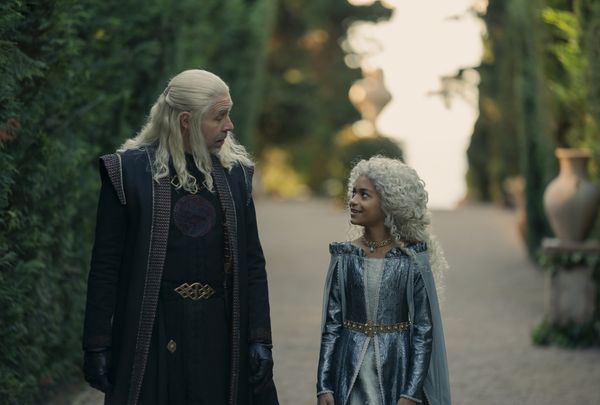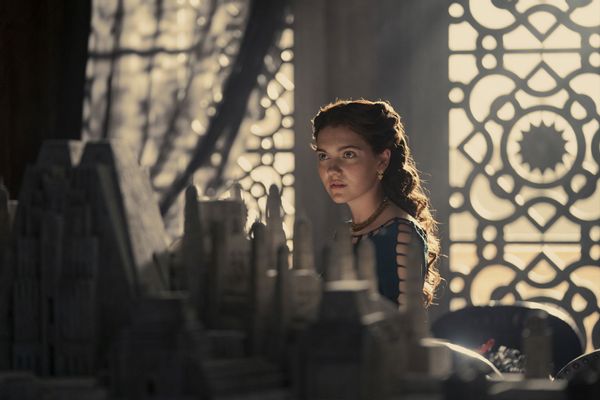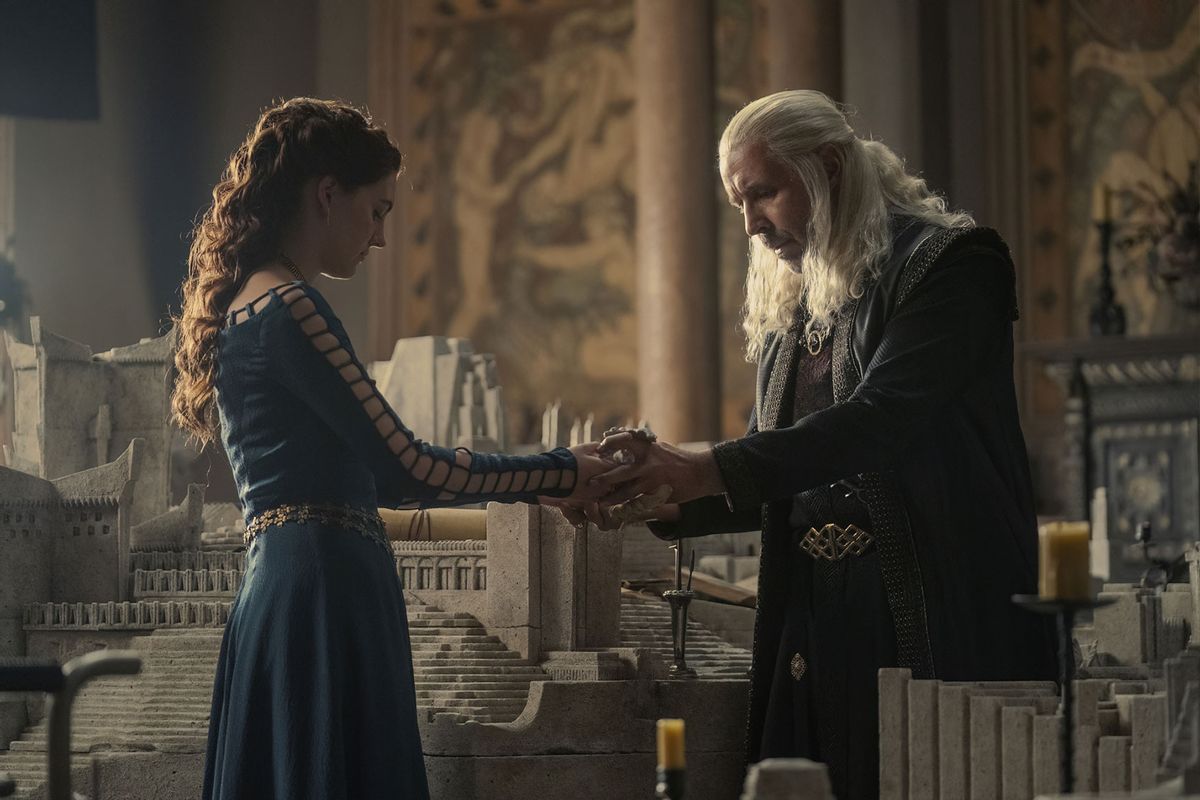It's not easy being king. Everyone is mad at you at some point. Sometimes you cut your finger on a poky throne. You have to make unpopular decisions, one of them being who you will marry not long after your wife's untimely death.
King Viserys I (the amiable Paddy Considine), the shaggy-haired ruler of "House of the Dragon," HBO's "Game of Thrones" prequel, handles most of the kingliness in stride. He shows up to work at the Small Council. He waits for everyone to punch in at their marble clock. He dips his hand into a tub of medicinal maggots, as one does. And he chooses.
First, he chooses his yet-to-be-born son over his laboring wife. Mistake, as both perish in or shortly after childbirth. Then he chooses a second wife. Nobody really laments the late Queen Aemma except her daughter, young Rhaenyra (Milly Alcock), and sometimes Viserys, who does everything with a kind of absent-minded, shrugging acceptance, at the mercy of his station. And nobody is happy about his second marriage choice, again except Viserys and (possibly) his bride-to-be Alicent Hightower (Emily Carey), who is quietly the best character by the series' second episode.
The King's marriage possibilities are grim, surprisingly slim by royal standards. The daughter of Lord Corlys Velaryon (Steve Toussaint) and Princess Rhaenys (Eve Best) is offered up as a potential choice. The only choice, according to Corlys and Rhaenys, still and forever stinging from her own denied opportunity at the throne as The Queen Who Never Was. It would be an advantageous match, unifying the strong Targaryen and Velaryon houses: both platinum-haired Valyrian stock. It makes sense, history-wise.
There are two problems with this choice. One: the daughter in question, Laena Velaryon (Nova Foueillis-Mosé), is not old enough to see above the Small Council table. She's incredibly young, even by fake medieval standards. The show amps the creep factor by having the actor who plays Laena look much smaller than Laena's allegedly 12 years with the mannerisms and reactions of a child quite a bit littler. Viserys and Laena go for a pre-courting stroll in the gardens, and it looks like a granddaughter out for a nice visit with her elderly relation. When even the King of this show thinks it's gross, you know it's gross — and how meta is this, that the story attempts to address our own unease with its history of sexual exploitation by bringing it out on the table right away?
 Paddy Considine as Viserys Targaryen, Nova Mosé-Foueillis as Laena Velaryon in "House of the Dragon" (Ollie Upton/HBO)The other issue is Alicent. The daughter of the Hand (Rhys Ifans ), Alicent is pushed by her father to comfort the king right after the death of his wife. We know what "comfort" means and we know Otto Hightower's intentions are anything but tenderhearted. He's going to use his daughter to worm his way into more power. But here's the thing about Alicent. She seems genuinely kind. She talks with the king, not only because her father tells her to, but because she appears to see in him a lonely, suffering man. She's long been the best friend of his daughter along with being one of the princess's handmaidens. The two young women share a spark, which is more than teenager (maybe?) Alicent shares with the older king.
Paddy Considine as Viserys Targaryen, Nova Mosé-Foueillis as Laena Velaryon in "House of the Dragon" (Ollie Upton/HBO)The other issue is Alicent. The daughter of the Hand (Rhys Ifans ), Alicent is pushed by her father to comfort the king right after the death of his wife. We know what "comfort" means and we know Otto Hightower's intentions are anything but tenderhearted. He's going to use his daughter to worm his way into more power. But here's the thing about Alicent. She seems genuinely kind. She talks with the king, not only because her father tells her to, but because she appears to see in him a lonely, suffering man. She's long been the best friend of his daughter along with being one of the princess's handmaidens. The two young women share a spark, which is more than teenager (maybe?) Alicent shares with the older king.
(Note: In George R.R. Martin's "Fire & Blood," Alicent is 18 when she weds the 27-year-old Viserys, while Rhaenyra is only 9. Whereas on the show it seems Alicent has been aged down to make the two girls cohorts, while aging Viserys up . . . which is a choice.)
Her only rebellion comes with her body.
But Alicent is not disgusted by him. It's not only mere duty to her creepy father that she talks with him for hours. She's trying, not just for the Hand but for the King. She's trying to be compassionate. She has at least a little more in common with the King than poor Laena. And Alicent is the only choice for the King's bride which wouldn't completely alienate the audience.
But her interest in the King's model city, for example (the fantasy equivalent of model railroading?), doesn't seem feigned. She's either a caring person or a great faker. Alicent is not a complainer nor a protester. Her only rebellion comes with her body. Nervously, perhaps unconsciously, Alicent picks at her fingers and hands. She picks at her skin until she bleeds, an anxiety disorder known in modern parlance as dermatillomania.
 Emily Carey in "House of the Dragon" (Ollie Upton / HBO)All is not right with Alicent, even if she would never utter a word about it. With this small humanizing detail alone, Alicent becomes one of if not the most interesting and sympathetic character on the sluggish "Dragon" stage. She's real and she's really hurting, and her life seems set up for tragedy. "You are the most comely girl at court," her father tells her. "Why do you destroy yourself?" Sometimes the answer to the question lies in the question.
Emily Carey in "House of the Dragon" (Ollie Upton / HBO)All is not right with Alicent, even if she would never utter a word about it. With this small humanizing detail alone, Alicent becomes one of if not the most interesting and sympathetic character on the sluggish "Dragon" stage. She's real and she's really hurting, and her life seems set up for tragedy. "You are the most comely girl at court," her father tells her. "Why do you destroy yourself?" Sometimes the answer to the question lies in the question.
Carey's eyes contain more than a hint of darkness.
A show that purports to be about female empowerment written by men, based on a book by a man, may end up being limited in its empowerment, particularly if the story falls back upon the easy sexual violence and victimization that defined its predecessor. "House of the Dragon" creators swear it's not going to do that. A better guess would be that the sexual violence takes place off-screen. Just because we can't see it doesn't mean it's not a cheap plot device. One of the only powers Alicent may have, as a pawn in this invented universe, is controlling her body in the small way she can, wounding herself first before others may wound her.
Want a daily wrap-up of all the news and commentary Salon has to offer? Subscribe to our morning newsletter, Crash Course.
In Carey's portrayal, Alicent is quietly unforgettable, in a corner but not forgotten. Carey's eyes contain more than a hint of darkness. Alicent is soulful. She's suffering. How much, and what price she and others will pay, remains to be seen.
"House of the Dragon" airs Sundays at 9 p.m. on HBO.
Read more
about "House of the Dragon"



Shares